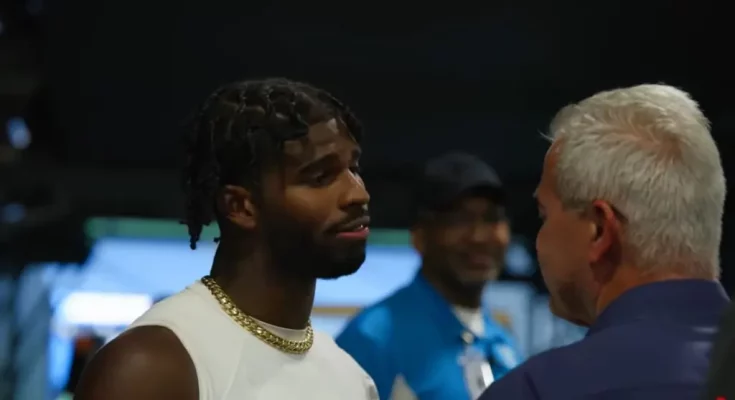**Shedeur Sanders Confronts Browns Beat Writer After Preseason Game: A Closer Look at the Incident**
The NFL preseason is often a time for teams to evaluate talent, fine-tune strategies, and give young players a chance to prove themselves. However, last week, a different kind of spotlight emerged when Shedeur Sanders, the talented rookie quarterback and son of Colorado head coach Deion Sanders, found himself in a heated exchange with one of the Cleveland Browns’ beat writers following the team’s preseason game. The incident has sparked discussions about media-player relationships, the pressures of being a high-profile rookie, and the challenges of navigating professional sports under intense scrutiny.
### **The Incident: What Happened?**
Details of the confrontation remain somewhat unclear, but multiple reports suggest that Shedeur Sanders approached the beat writer in the post-game media area, visibly frustrated over something that had been written or said about his performance. Witnesses described the interaction as tense, with Sanders expressing his displeasure before eventually walking away. The exact content of the exchange has not been fully disclosed, but it appears to have stemmed from critical coverage of Sanders’ play during the game.
As a rookie trying to establish himself in the NFL, Sanders has been under a microscope, not just because of his own potential but also due to the legacy of his father, Deion Sanders—one of the most iconic figures in football history. The added pressure of carrying the Sanders name means every performance, good or bad, is dissected more than that of the average rookie.
### **Possible Triggers for the Confrontation**
While the exact comments that led to the confrontation remain speculative, several factors could have contributed to Sanders’ reaction:
1. **Criticism of Performance** – Preseason games are often sloppy, with players still adjusting to NFL speed and playbooks. If the beat writer singled out Sanders for mistakes—whether inaccuracy, decision-making, or lack of chemistry with receivers—it may have struck a nerve, especially if Sanders felt the critique was unfair or overly harsh.
2. **Comparisons to His Father** – Shedeur has spent his entire football career being compared to Deion, a Pro Football Hall of Famer. While Shedeur plays quarterback—a completely different position—the expectations are sky-high. Any suggestion that he isn’t living up to the Sanders name could feel like an unnecessary burden.
3. **Misquotes or Misinterpretations** – Sometimes, players feel that reporters twist their words or take quotes out of context. If Sanders believed his post-game comments were misrepresented, it could explain his frustration.
4. **Personal Attacks** – While unlikely, if the criticism crossed the line from football analysis into personal remarks about Sanders’ work ethic, attitude, or background, that could certainly provoke a strong reaction.
### **The Broader Context: Player-Media Tensions**
This incident is not isolated in the world of professional sports. Athletes and journalists have always had a complicated relationship—one built on mutual need but often strained by differing perspectives. Players want their stories told fairly, while reporters aim to provide honest analysis, sometimes at the expense of a player’s feelings.
In recent years, social media has amplified these tensions. Players no longer rely solely on traditional media to share their narratives; they can communicate directly with fans via platforms like Twitter, Instagram, and TikTok. This shift has led some athletes to view traditional media with skepticism, believing that reporters are more interested in generating clicks than offering balanced coverage.
For Shedeur Sanders, who grew up in the spotlight and has been accustomed to media attention since high school, the transition to the NFL—where scrutiny is even more intense—may be an adjustment. His reaction, while unprofessional if overly aggressive, could also be seen as a young player learning how to handle criticism at the highest level.
### **How Should Shedeur Handle Media Moving Forward?**
While emotions can run high after games, especially in high-pressure environments, Sanders will need to develop strategies for dealing with criticism as his career progresses. Some possible approaches include:
– **Choosing His Battles** – Not every critique requires a response. Learning to ignore unfounded criticism while using constructive feedback to improve is key.
– **Leveraging Team PR Resources** – Most NFL teams have media training programs to help players navigate interviews and press interactions. Sanders could benefit from additional guidance.
– **Using Performance as the Best Rebuttal** – The most effective way to silence critics is by playing well. If Sanders continues to develop and proves himself on the field, negative coverage will fade.
– **Engaging Respectfully** – If he disagrees with a reporter’s take, addressing it calmly and professionally can earn respect rather than creating controversy.
### **The Role of the Media in Covering Young Athletes**
On the flip side, this incident raises questions about how media members cover young players, particularly those with famous last names. Are beat writers too quick to judge rookies in meaningless preseason games? Should there be more patience in evaluating developing talent?
While it’s a reporter’s job to analyze performances, there’s a difference between fair criticism and overly harsh takes, especially for players still adjusting to the NFL. Finding that balance is crucial in maintaining trust between athletes and journalists.
### **Conclusion**
The confrontation between Shedeur Sanders and the Browns beat writer is a reminder of the intense pressures faced by young athletes in the NFL. While Sanders’ reaction may have been emotional, it underscores the challenges of being a high-profile rookie under constant evaluation. Moving forward, both players and media members can benefit from a more measured approach—one where criticism is constructive, and responses are professional.
For Shedeur, this moment could serve as a learning experience in his journey. How he responds—both on and off the field—will determine whether this incident becomes a minor footnote or a turning point in his career. One thing is certain: all eyes will remain on him as he navigates the challenges of being an NFL quarterback and the son of a legend.



